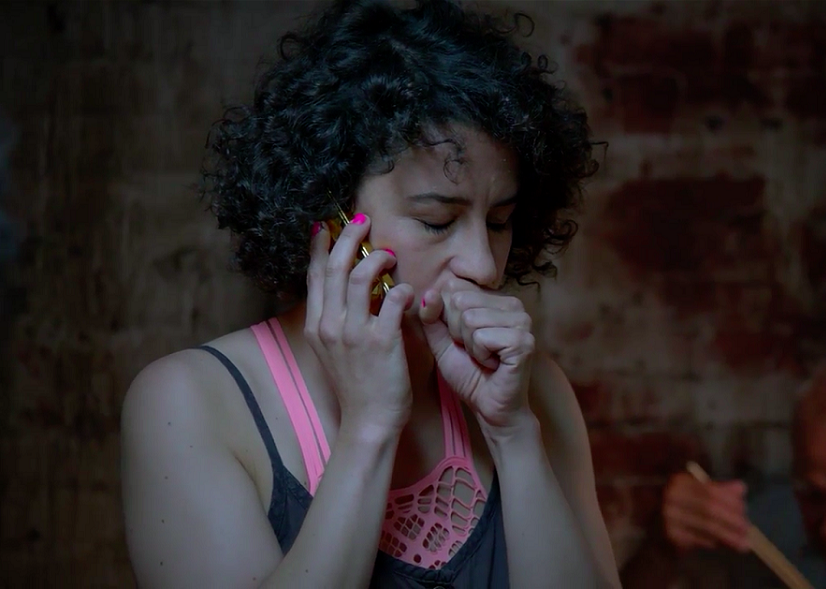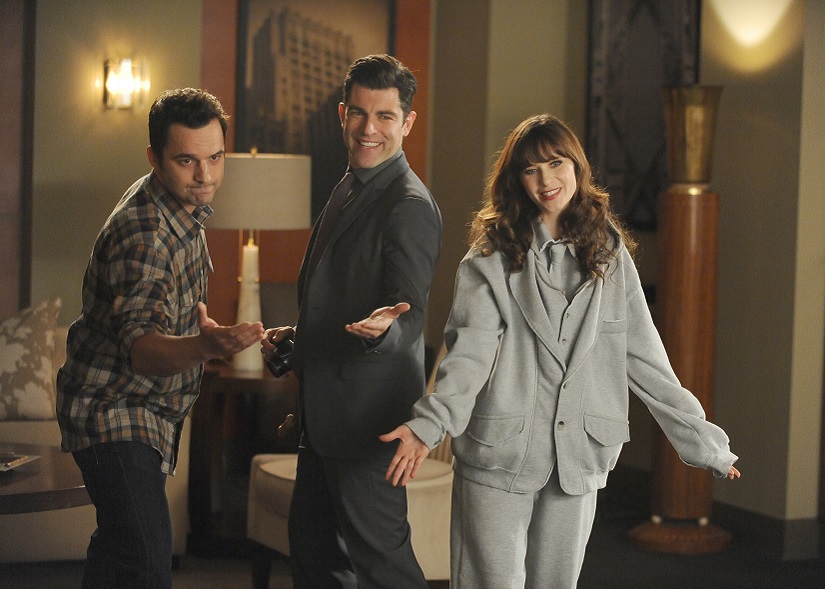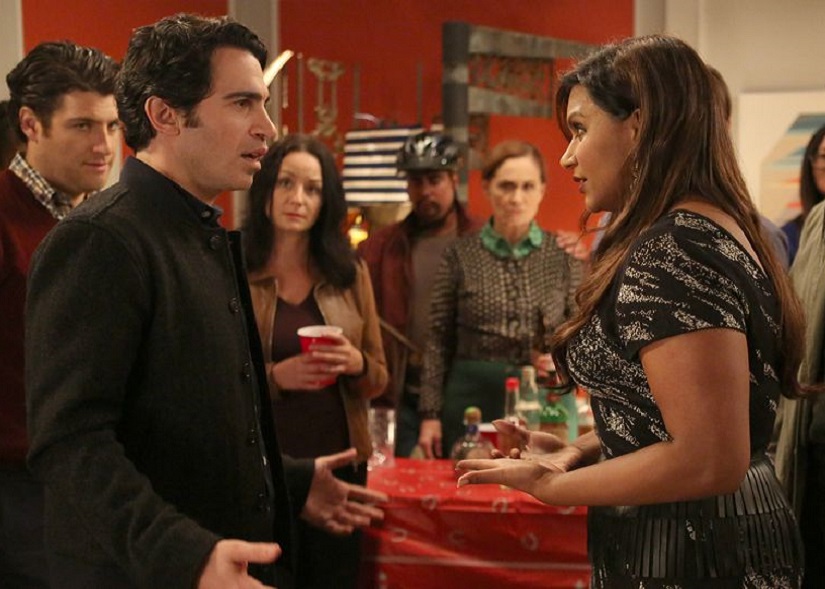This Week in TV is a new weekly feature reviewing the best, worst and most interesting episodes of television from the past seven days. The plan is to cover a wide variety of shows, but not always the same ones each week, so let us know in the comments which ones you’d particularly like to read about. This week takes a look at the ladies in television, starting with a big reveal on Jane The Virgin, a strap-on standoff in Broad City, Jess trying to save a disastrous business pitch in New Girl and big moves in The Mindy Project.
Jane The Virgin – “Chapter Twelve”. Jane The Virgin has been this season’s critical darling since its debut last October, another triumph for the CW in its expanding library of strong genre programming. Jane‘s near perfectly balanced blend of melodrama, comedy and pathos came out of the gate fully formed and making an instant star of lead actress Gina Rodriguez, whose performances have infused the sharp writing with soul and sweetness. Twelve episodes in and there’s no signs of slowing down: Rodriguez’s Jane remains far and away the most huggable person on television, while each episode somehow manages to pack in moments of sincere, heartfelt sweetness alongside a cavalcade of increasingly loopy plot developments. The news last week that Jane was to become a writer for a telenovela threatened to be a little too cute for its own good, but worked perfectly in the context of this episode: she’s delighted to be offered the chance to write an episode of her own, but less so when it is revealed she was only chosen because no-one else was willing to write a death scene for diva-ish star Rogelio, who is also Jane’s father.
Jane’s struggles to write Rogelio’s big death scene at the end of her episode meant a fun little jaunt through the series’ main themes. Having her take inspiration from a moving act of forgiveness from her grandmother was a perfect resolution for a show which has always put family and empathy front and centre, but the realisation that making the scene sing meant embracing the spirit of the telenovela was no less important. That spirit is what has given Jane its identity and the acknowledgment felt like the writers giving a nod to the fact they know exactly what their show’s strengths are and how to play to them. That decision also informed the big reveal of Sin Rostro’s identity, which played out in the most deliciously ludicrous manner as Rose drowned Emilio in cement – a pretty nasty way to go, all things considered, but finding just the right application of camp to stay on the right side of nastiness. The same was true of the fantastic pre-commercial scene of Milos seemingly slitting Petra’s throat, a twist so shocking it went full circle into hilariousness, only to be revealed as a ruse to prove Magda was faking her disability.
While I still feel that Jane‘s hyper-condensed plotting can get a little exhausting over a full hour – two half-hours per week might be a better fit – the show continues to demonstrate such a masterful command of tone and momentum, not to mention a cast impossibly adept at making the comedy and drama work in tandem without cancelling each other out, that it is rarely anything less than a delight.
Broad City – “Knockoffs”. Broad City boggles the mind in the best possible way, because even at a time when Archer and Rick & Morty exist, it still manages to go places you could never in a million years imagine a television show – a live-action one, no less – getting away with, especially when committing to its filthiness with such unrestrained delight. A comparison between the doe-eyed Jane The Virgin and a show as bawdy as this may seem a tad misguided on the surface considering the, erm, contrasting nature of the material, but there’s a definite similarity in what allows the two shows to get away with what they do: in Jane‘s world, the craziness of the plotting; in Broad City, being able to dedicate an episode’s main plotline to strap-on sex and one man’s devotion to his personalised, ethically sourced green dildo.
Both shows, at their heart, are about family and friendship. Ilana and Abbi may be trashier, louder and more clumsily hopeless at everyday existence than Jane‘s open-hearted clan, but it’s their unconditional support and affection for each other which keeps Broad City charming. Take, for instance, the strap-on plotline. A lesser show would likely make fun of Jeremy for his kinks or Abbi for her discomfort, but Broad City actively celebrates that weirdness, a spirit hysterically embodied by Ilana’s dance of joy at discovering Abbi’s situation. Make no mistake, it’s very, very funny stuff, especially the For Your Eyes Only-riffing shot between Abbi’s legs of the dildo dangling down over a delighted Jeremy, but there’s a sincere sense of love at the idea of two people pushing the boundaries of their sexuality. That positivity is what fuels and humanises the comedy, appreciating the fact people can be into to some pretty unexpected stuff, but that’s OK because it’s what makes them who they are. The argument which broke Abbi and Jeremy up may have seen Jeremy act like a bit of a dick (I know, I know) over the specifics of his kink, but there’s no sense of finger-pointing because it had already been established how important it was to him.
Meanwhile, Ilana and her mother’s B-plot was pretty much just a series of ridiculous events – from collecting knock-off handbags in a sewer to being arrested en-route to a funeral – but punctuated with some great gags, from the pair’s inherited similarities – vigorously shaking the nail polish in unison – to Bob Balaban’s flustered turn as Ilana’s dad. It’s a terrific sequence that may not have much substance behind it, but worked as a hilarious insight into a day out with a particularly eccentric family.
New Girl – “Swuit”. ‘Swuit’ isn’t an especially funny episode of New Girl, but does demonstrate that after a disappointing third season in which overcomplicated plotting and tedious romantic complications weighed heavily on the show’s lightness of touch, showrunner Elizabeth Meriweather has managed to get things back on track by returning to the simple comic formula of the first two seasons even if the jokes don’t always land as precisely as they should. The show’s greatest strength is in bouncing the loft’s four utterly ridiculous personalities off each other under increasingly fraught circumstances. Pairing them up resulted in those personalities being shackled by having to work as part of a credible couple, particularly as the cast’s comedic straight men have been provided almost exclusively by supporting characters such as the ever-incredulous Cece – huge shout-out here to Hannah Simone for what must be one of the funniest range of aghast expressions on television. It’s the fact that the five main characters are so completely useless at working together, but try so hard anyway, that has been at the heart of many of New Girl‘s funniest episodes.
In that respect, ‘Swuit’ should’ve been onto a winner in focusing on Nick and Schmidt’s attempts to come up with a business plan together under the pressure of an impending deadline pitch. For all that it’s possible to analyse everything down to the most minute detail, the simple truth is that sometimes the jokes just don’t quite hit even when they probably read fantastically well on paper. Nick and Schmidt shouting lovely things at Jess was never much more than mildly amusing, despite being an appropriate reaction on a character level for two furious people who nevertheless appreciate their friend’s good intentions. The stammering pitch to Lori Greiner started well, but faded once the joke’s single dimension wore thin. Winston and Coach investing in Cece’s future up until discovering that future would be built on an arts degree was pretty funny – especially the course professor’s resigned despair at his lot in life – but never quite found the spark to really take off. Regardless, that ‘Swuit’ proved one of the weaker episode in recent weeks is testament to how well New Girl has stabilised itself after last season’s near-collapse.
The Mindy Project – “No More Mr. Noishe Guy”. All cards on the table, I’d never watched The Mindy Project before this week, but with all of this article’s shows having a somewhat feminine bias, thought I’d fully commit to the idea by taking a look at a show which seems to have grown in popularity and appreciation over the past few seasons. As a first time viewer, it’s easy to pick out the elements which likely inspired that creative revival: Mindy Kaling is a perfectly likeable presence at the centre of the show, with a similar set of core characteristics – professional competence masking a scatterbrained personal life, devotion to food, lack of appreciation from her colleagues – to the late, great Liz Lemon. The overall tenor of the show is more low-key in its zaniness than 30 Rock or Parks & Recreation, but shares an appreciation for offhand silliness, whether delivered via a quick-one liner or a visual gag like a rat-infested brownstone.
The problem is that while low-key is fine, it here led to everything feeling strangely subdued. On the evidence of ‘No More Mr. Noishe Guy’, the more outlandish quips felt somewhat at odds with a mood that would seem better suited to more dry, subtle humour than Mindy being mistaken for Malala Yousafzai – which, admittedly, is supposedly based something Kaling experienced in real life – or getting all her medical treatments done at once. The quirks of Mindy the character also seem a little too indebted to Liz Lemon, but struggled to integrate as well in a character played relatively straight. The show broadly felt more geared towards its dramatic elements, which included an effectively played thoroughfare about having to adapt to life taking major turns out of the blue, than its comedic ones, which tended to come in fits and starts. Obviously as someone coming in at what is a major turning point of the season, with one character leaving the show and a pregnancy revelation throwing Mindy’s life into further disarray, there are undoubtedly plenty of nuances which will have passed me by – hopefully the personalities of the non-Mindy characters feel more distinct with the benefit of long-term viewing, for instance. The show seems perfectly agreeable, but with Broad City, New Girl and Parks & Rec leading the line and 30 Rock still fresh in memory, a distinctly disposable entry in the resurgent field of female-led comedy.



